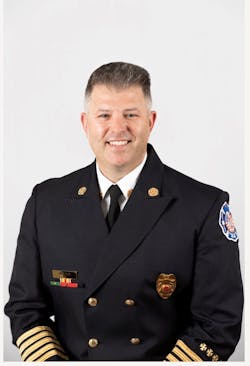The Company Officer: Fire Service Leadership Lessons from 'Yellowstone'
Key Takeaways
- Actions or decisions that are consistent with a fire department’s identity include staying true to the organizational values and messaging while remaining relevant in current trends.
- A fire department leader’s “brand” is seen in the way that the individual’s mission is carried out daily for the people who the leader serves, both inside and outside of the organization.
- Fire department leaders should ask themselves: Do I inspire or deflate? Do I decide or waiver? Am I compassionate or callous? Do I move people forward with a unified mission or do I detract from growth for personal agendas?
How does your adaptive leadership style create a brand with your team? How does your brand drive change, inspire and unite people through collaboration, empowerment, values and relationships?
The journey
I must admit, I am well behind the curve of the “Y” in the hit series “Yellowstone.” I watched the prequels first. I learned the back story of the series’ Dutton family tree and each generation’s hardships and opportunities to grow and settle. I was reminded how any journey that’s worth taking can involve loss, grief, loyalty, grit, resilience, love and hope. So, for the “Yellowstone” fans who are reading this and the future “Yellowstone” converts, I hope the connection between leadership, brand creation and loyalty and the Dutton family history—via quotes included below—will help to shape not just who you are but who you serve and how your brand is influenced by leaders, with leaders and for your teams that are full of leaders. Let’s journey as a fire service family, because each of us has experienced some level of loss, grief, loyalty, grit, resilience, love and hope in the best damn job in the world.
John Dutton III
“A brand isn’t something you earn; it’s something you live up to.” In your fire department, what is your brand?
As we saddle up with Dutton’s quote, we might find conflict in the differing perspectives, which sparks conversations through diverse lenses that can reshape how to establish a brand and believe in it. Branding is critical, particularly as the fire service competes with several factors, such as communicative differences, lack of pay parity and our recruitment crisis.
On-brand can be actions or decisions that are consistent with an organization’s established brand identity. This includes staying true to organizational values and messaging while remaining relevant in current trends.
Over time, companies and organizations realized that they could differentiate themselves by creating unique logos, slogans and other visual elements that help consumers to recognize their products. In our realm, we have the Maltese cross, which is a recognizable brand throughout the world. We have immediate trust with the community members who we serve. Although we built that trust, much of it has been given, not earned. In fact, one could argue that we are “living up to the trust” that’s given as a brand in itself.
As time passed, branding became more sophisticated, incorporating not just visual elements but also messaging and values that resonate with the public. A brand separates loyalties and competitors.
So, considering Dutton’s claim—“A brand isn’t something you earn; it’s something you live up to.”—without knowing your brand, how would you know what you must live up to?
As a team, when you establish your values and mission, your identity (who you are and your purpose) becomes increasingly clear. Now what? The intent isn’t another slogan or motto to throw on a poster in a firehouse or on the base of your ladder. The intent is to be intentional with how your culture lives up to what was established, while creating necessary cultural shifts that the fire service desperately needs for all of those who choose the fire service as their calling.
I believe that when you live up to your brand—one that consistently challenges “This is the way we have always done it” or “We like our members-only-club jacket just the way it is”—you authentically earn the right as a leader to claim an identity that is on-brand.
Dutton said, “It’s the one constant in life. You build something worth having, someone’s gonna try to take it.” So, protect your brand, have honor in your brand and live out your brand, because these are driven by your values and are seen in the way that your mission is carried out daily for the people who you serve as a leader, both inside of the organization (your team) and outside of the organization (your community).
Rip Wheeler
“You see, it’s the habit of living that you’re scared of losing, that’s all.” Consider the question: How are you choosing to live your life and to whom or to what are you attached?
As we saddle up with these 14 words, we might find ourselves in some self-reflective conflict. Much like rough and gruff “Yellowstone” character Rip, there’s a side that softens when we allow ourselves to rest in reality and embrace the “suck” as a fearless leader.
A learning, living leader fosters habits of servanthood, humbled each day, because authentic leadership is a humble posture, where, through self-realization of your “Y”, your purpose for people toward progress and new opportunities is driven. Ask yourself: What leadership habits help you to live an abundant life that influences others?
In the end, we have our name and our character, which aligns with our identity, which is driven by values and how we treat others. Do we inspire or deflate? Do we decide or waiver? Are we compassionate or callous? Do we move people forward with unified mission or do we detract from growth for personal agendas?
Rip says, “You know what work is, don’t you?” Leadership is heavy work, and servant leadership is the heaviest. That said, when you embrace new habits of serving others, serving the work and serving the mission, the only thing to be scared of losing are endless opportunities and those, well, are endless for a reason.
Beth Dutton
“I believe in lovin’ with your whole soul and destroying anything that wants to kill what you love. That’s it. That’s all there is.” Consider the question: What is trying to destroy or kill your love for the job?”
I am not a huge Beth fan, but this is one quote with which I connected deeply. It shares valuable insight into the soul leadership branding and the “Y” behind how the soul is capable of the impossible.
The ugly side of the fire service (ego, territorialism, some traditions) attempts to destroy what love works so hard to build. How do you stay in love with a job that doesn’t love you the same or loves you differently? It isn’t that love doesn’t exist; it’s that love takes work, sacrifice and intentionality, particularly through difficult seasons. I believe in lovin’ with my whole soul the people who I work for as a fire chief (my firefighters) and working hard to stay in love with the job that will forever be a part of my soul.
Kayce Dutton
“The only thing I’ve got left is to make a future for my son. This is the only thing I’ve got to give him.” Consider the question. How will my effect as a leader invest in the future of the fire service?
Look deep within yourself, find your “Y”, build your leadership brand and go live up to it.
About the Author

Dr. Brett Ellis
Dr. Brett Ellis is a 27-year veteran of the fire service and serves as the fire chief for the city of Webster Groves, MO. He holds a bachelor’s degree in fire administration from Western Illinois University, a master’s degree in leadership and adolescent development from Huntington University and a doctorate in education from Concordia University-Portland. As a consultant (AGILE Leadership Consulting Inc.), Ellis focuses on leadership, firefighter behavioral health, conflict resolution, officer development, organizational movement, relationship building and personnel role plays that are based on fire service lawsuits. As well, he teaches for the National Fire Academy and Columbia Southern University.
